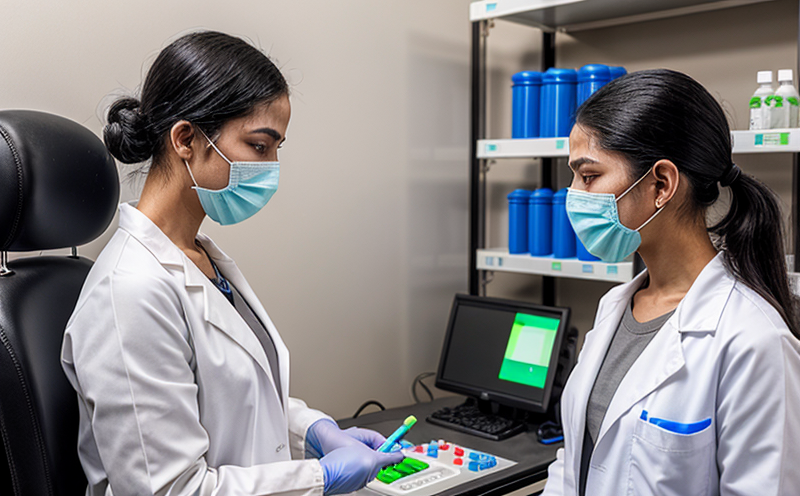In Vitro Sister Chromatid Exchange Testing
The In Vitro Sister Chromatid Exchange (SCE) testing is a critical method used in pharmaceutical testing to evaluate potential genotoxic effects of compounds on human cells. This test measures the frequency of sister chromatid exchanges, which are non-disjunction events that can lead to chromosomal abnormalities and ultimately contribute to carcinogenicity or mutagenicity.
Pharmaceutical companies rely heavily on this testing because it helps identify early-stage genotoxic risks before a compound progresses through clinical trials. By detecting such risks early in development, companies can avoid costly and time-consuming drug rejections later in the pipeline. The test is particularly valuable for new chemical entities (NCEs) where no prior human data exists.
The process involves culturing cells from an appropriate cell line under controlled conditions. Once the cells have divided to form sister chromatids, they are exposed to the compound of interest. After a defined incubation period, the cells are fixed and stained with Giemsa dye. Microscopists then count the number of SCEs per metaphase image. The frequency of these exchanges is reported as a percentage.
The primary advantage of in vitro SCE testing lies in its ability to provide rapid results compared to in vivo tests, which can take much longer and require more animals. Moreover, this method allows for controlled exposure conditions that are not always feasible with animal models. This makes it an ideal tool for early-stage safety assessments.
The test is governed by several international standards such as OECD Guideline 473 and ISO/IEC 17025 for laboratory accreditation. Compliance with these standards ensures the reliability and accuracy of results, which are crucial for regulatory submissions.
Despite its advantages, it’s important to note that in vitro SCE testing does have limitations. It may not fully capture all aspects of genotoxicity that occur in vivo. Therefore, it is often used alongside other tests like the Ames test or micronucleus assays to provide a comprehensive assessment.
Benefits
The In Vitro SCE test offers several significant benefits, making it an indispensable tool in pharmaceutical testing:
- Rapid Results: Provides quick insights into genotoxic potential before extensive animal studies are conducted.
- Cost-Effective: Reduces overall costs associated with later-stage rejections of compounds due to genotoxicity issues.
- Comprehensive: When used alongside other tests, it provides a more comprehensive understanding of the compound's safety profile.
- Regulatory Acceptance: Results are widely accepted by regulatory bodies and can accelerate drug approval processes.
The test is particularly advantageous in early-stage drug development where timely identification of potential risks is crucial. It allows for informed decision-making, potentially saving substantial resources and time.
Quality and Reliability Assurance
To ensure the highest quality and reliability of In Vitro SCE testing, our laboratory adheres strictly to international standards such as ISO/IEC 17025. This accreditation ensures that all procedures are conducted in a controlled, consistent manner.
We employ highly trained personnel with extensive experience in pharmaceutical testing. Our state-of-the-art facilities include advanced microscopes and software for precise image analysis. Regular calibrations of equipment ensure accuracy and reliability of results.
Data integrity is maintained through robust quality control measures. Each test undergoes multiple checks to catch any discrepancies early. This commitment to excellence ensures that all reports are accurate, reliable, and meet the highest standards expected by regulatory bodies.
Competitive Advantage and Market Impact
- Pioneering Approach: Our expertise in In Vitro SCE testing positions us as leaders in genotoxicity assessment. This places our clients at an advantage when navigating the competitive landscape of drug development.
- Rapid Turnaround: By providing timely results, we enable quicker decision-making and faster time-to-market for new pharmaceutical products.
- Comprehensive Insights: Our testing methods are not limited to SCEs; they encompass a broader range of genotoxicity assessments. This comprehensive approach gives our clients an edge in understanding the full impact of their compounds on human health.
- Regulatory Compliance: With strict adherence to international standards, we ensure that all results meet regulatory requirements. This reduces compliance risks and enhances marketability.
Our commitment to innovation and excellence has earned us a reputation for reliability and accuracy. By choosing our laboratory for In Vitro SCE testing, clients can be confident in the quality and relevance of their data, which is critical for success in today’s competitive pharmaceutical industry.





